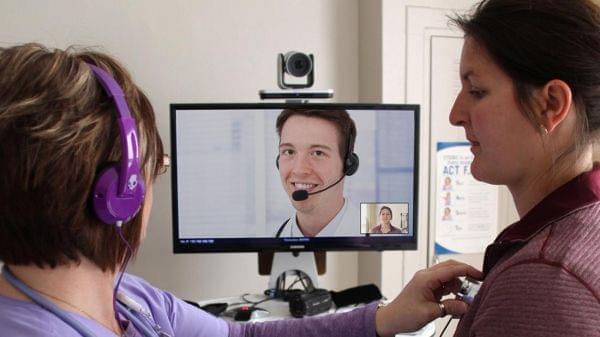Expanding Telehealth In Illinois Could Connect Underserved Patients To Care: Task Force

SIU School of Medicine
Expanding access to telemedicine could help bring specialty care to rural and underserved communities in Illinois, according to Nina Antoniotti, executive director of telehealth at SIU Medicine in Springfield.
Antoniotti is a member of the state’s telehealth task force, which has been charged with making recommendations for regulatory changes that will remove barriers to telehealth for patients insured by Medicaid, the joint federal and state health insurance program for low-income residents.
She said the task force wants Illinois to loosen restrictions on what kinds of providers can provide telehealth services to Medicaid recipients, and where those patients must be to receive those services.
Current Medicaid regulations, which are determined by the Illinois Department of Healthcare and Family Services (HFS), limit the majority of telehealth services to care provided by medical doctors to patients in a hospital or clinic setting, Antoniotti said.
The regulations prevent clinical psychologists and social workers from being able to provide mental and behavioral health services to children while they are in a school setting. This, despite research studies that show tele-mental health services are effective and increase access to care.
“If HFS would just change their payment policies, we could do more around the state and help children who are at school get these mental health services that they need,” Antoniotti said.
Telehealth services have been in schools for decades, she said, but are limited to school districts, mostly in the Chicagoland area, that can afford to pay for them or have financial support from grants and private endowments.
If providers could bill Medicaid for providing the care, Antoniotti said, it could be a win-win for both children in need of services and the schools districts that would otherwise have to foot the bill.
A measure awaiting action from Governor Bruce Rauner would increase access to telehealth services in out-of-hospital settings, including in schools. It would allow, for example, children covered by Medicaid to receive tele-mental health services in schools -- from clinical psychiatrists, psychologists or social workers -- and allow those providers to bill the state for their services, instead of charging the school districts.
But Antoniotti said there’s another problem: Illinois has very low rates of Medicaid reimbursement for psychiatry and mental health services.
“[It’s] significantly lower than what Medicare and private payers pay,” she said.
Those low payments from the state will continue to be a barrier to getting providers to serve patients on Medicaid, she said.
The state’s telehealth task force is co-chaired by Lt. Gov. Evelyn Sanguinetti. The group is preparing a report to send to Gov. Rauner with a summary of their recommendations.
Follow Christine on Twitter: @CTHerman

